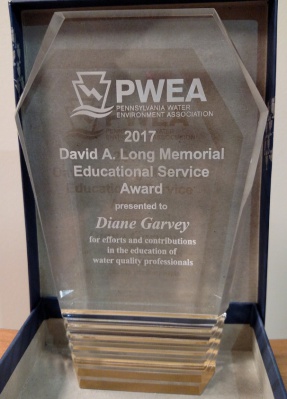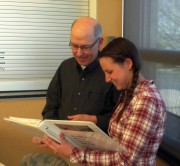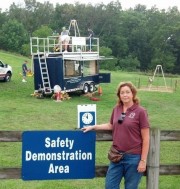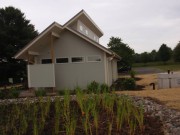Latest News and Upcoming Events
Check here for the latest news and information about upcoming events.
Diane Garvey presented the paper "Biosolids Stabilization" at the National Association of Wastewater Technicians (NAWT) 8th Waste Treatment Symposium on August 23rd, 2017. The presentation covered Pathogen and Odor Reduction in Biosolids.
The Symposium took place in Monroeville, PA from August 23rd to August 24th, 2017.
Proposed Changes to General Permits for Biosolids and Septage Beneficial Use
The Department of Environmental Protection stated that General Permits for the Beneficial Use of Biosolids by Land Application (PAG-08), the Beneficial Use of Exceptional Quality Biosolids by Land Application (PAG-07), and the Beneficial Use of Residential Septage by Land Application (PAG-09) are being extended through April 2, 2018. The original expiration date was April 2, 2014. These permits cover land application of septage, Class B biosolids and Exceptional Quality biosolids.
If you are operating under these Permits, you may continue to operate until April 2, 2018, or the expiration date of coverage identified on the permit coverage approval page, whichever is later. According to the PA Bulletin notice, the DEP is extending the availability of these permits to adequately complete preparation of their renewal.
Closer to the new expiration date, the PADEP will publish the proposed changes, followed by a 30 day comment period and public hearing, if requested. The PWEA Biosolids Committee and the Regulatory Affairs Committee, as well as the PA Septage Management Association, are jointly working to establish lines of communication with PA DEP regarding any proposed changes.
To access the General Permit and related documents, visit www.elibrary.dep.state.pa.us and select ''Permit and Authorization Packages,'' ''Point and Non-Point Source Management,'' ''Biosolids,'' ''General Permits'' and ''PAG-08, PAG-07, or PAG - 09.''
Questions regarding these Permits should be directed to Linda C. Baxter, PADEP Water Program Specialist, Division of Planning and Permitting at (717) 783-9717 or linbaxter@pa.gov.
Recently, the Water Environment Federation released a new fact sheet titled "Land Application of Biosolids: Human Health Risk Assessment Related to Microconstituents."
The Conclusions Section has been summarized below:
"Diet, lifestyle, ingestion of house dust and inhalation of indoor air are the major sources of microcontituent exposure to humans (Hundal et al., 2011). Land application of biosolids may only account for minor exposure to some microcontituents at the most. On an average, 7.2 million dry tons of biosolids are produced in the U.S. annually and only 55 percent are land applied. Less than 0.12 % of the nation’s total cropland receives biosolids application. This leads to the logical conclusion that only a small fraction of the total population consumes biosolids-fertilized crops and resides in the vicinity of biosolids-fertilized farmland. Therefore, the land application of biosolids alone cannot account for a significant amount of human exposure to microcontituents (USEPA, 1995).
"...the biosolids-derived microconstituents have low bioavailability and are not very mobile in the soil profile. Lipophilic microconstituents like PBDEs are not generally taken up by the plants. Less lipophilic microconstituents tend to accumulate in vegetative parts of the plant and are generally not detected in grains, which further limit their translocation into the food chain. These arguments strongly suggest that land application of biosolids would not be a major pathway for human exposure to microconstituents.
"Furthermore, experience with similar organic chemicals from Part 503 Risk Assessment shows that risk to humans is de minimis.
"As a society, our exposure to microconstituents can be reduced by being smart consumers. Uses of antimicrobials in personal care products, excessive use of PBDEs and APEs in consumer products,
and indiscriminate use of phthalates, BPA and PFCs in personal care and consumer products are unnecessary. Simply avoiding or minimizing use of such products can greatly reduce environmental
contamination and human exposure. Also, regulatory agencies could help in reducing the environmental burden by banning unnecessary and indiscriminate use of microconstituents (recent bans on
triclosan, triclocarban, and perfluorochemicals are good steps in the right direction) and by promoting non-toxic biodegradable alternatives."
Diane will be attending the Mid-Atlantic Biosolids Association Conference on July 18th and 19th.
MABA Summer Technical Symposium in Linthicum Heights, MD
Tuesday, July 18 to Wednesday, July 19th, 2017
Making Connections for Effective Biosolids Management
Diane Garvey was recently awarded the David A. Long Memorial Educational Service Award by the Pennsylvania Water Environment Association!
This award was established in honor of Dr. David A. Long in recognition of his lifelong service and dedication toward the education and training of wastewater and water treatment plant operators and environmental professionals.
This award is presented to individuals who distinguish themselves through their efforts and contributions to the education of water quality professionals.
Diane presented at three events in September, 2016:
EPWPCOA Meeting and Trade Show in Leesport, PA
Friday, September 16, 2016
The title of the presentation was: “The Phosphorus Index and the Impact on Land Application of Exceptional Quality and Class B Biosolids.”
The conditions of the General Permits for Land Application will be revised and reissued in April 2017 to include an evaluation of each field for the Phosphorus Index. This presentation will evaluate the impacts of this change and provide recommendations to prepare for these new regulatory requirements.
WEFTEC 2016 – Technical Exhibition and Conference in New Orleans
Technical Session #410, “Sludge Hydrolysis,” Tuesday, September 27, 2016 at 2 PM
This was a presentation of a paper written by Diane Garvey et. al. entitled, “Hydrolysis Process and High Solids Liquid Fertilizer Reduce Land Application Costs & Complies with Nutrient Management Regulations”
The Issue: With the growing interest in Resource Recovery, many biosolids producers are keen to continue to
recover the nutrients and organics in their biosolids through land application to agricultural lands. The traditional land application of dewatered biosolids, however, often raises concerns from
regulators and the public about odors, dust and nutrient run-off. In addition, newly implemented or soon to be implemented Nutrient Management Regulations in each state will limit how much and where
biosolids may be used in agriculture.
The Solution: Over the last 8
years a number of biosolids producers in Canada have made use of a biosolids hydrolysis process to overcome stakeholder concerns. This process produces a high solids EQ biosolids liquid that can be
land applied in a way that offers a number of benefits to the ratepayer, the public, environmental regulators, and the farmer.
EPWPCOA Event “Beneficial Use of Biosolids in Mine Reclamation” in St. Clair, PA
Session entitled “General Permitting for Beneficial Use” on Friday, September 30, 2016 at 10:45 AM
This presentation covered the process of General Permitting for the Beneficial Use of Biosolids, including the requirements for biosolids quality, preparation of sampling plans for biosolids permitting, and the preparation of Biosolids Quality Enhancement Plans for use in the Land Application and Beneficial Use of Biosolids.
As a speaker at NYWEA the Industrial Wastewater Committee Seminar on April 21, 2015, Diane made presentations on the following topics:
"Processing Biosolids to Meet Standards for Exceptional Quality Biosolids" and "Potential for Marketing Exceptional Quality Products."
Diane attended the PWEA Annual Technical Conference, PENNTEC 2014, from June 1 to 4 at the Penn Stater Conference Center in State College, PA.
Diane was a participant at WEF's 26th Annual Residuals and Biosolids Conference in Raleigh, NC from March 25 to 28, 2012. She attended the workshop, "Why Develop a Nutrient Management Plan - Emerging Issues in Nutrient Management Programs for Class A and Class B Biosolids" and moderated a session entitled, "Sustainability, Climate Change, and Greenhouse Gas Issues."
Diane attended the 2012 Ag Progress Days at Penn State University. While there, she participated in a confined space entry training course and met one-on-one with a business consultant from PSU's Small Business Development Center.
ATTENTION WERF SUBSCRIBERS - all presentations from the WEFTEC 2011 WEF/WERF Workshop 208, entitled "Better Safe Than Smelly: An Action Plan to Remedy Bacterial Regrowth, Odors, and Sudden Increase (ROSI) in Biosolids," are now available for download at the website below.
http://www.werf.org/c/WEFTEC/2011_Presentations/Workshop_208_Better_Safe_Than_Smelly.aspx
Diane was a participant at WEF's 26th Annual Residuals and Biosolids Conference in Raleigh, NC from March 25 to 28, 2012. She attended the workshop, "Why Develop a Nutrient Management Plan - Emerging Issues in Nutrient Management Programs for Class A and Class B Biosolids" and moderated a session entitled, "Sustainability, Climate Change, and Greenhouse Gas Issues."
Diane Garvey attended WEFTEC 2011 in Los Angeles from October 15 - 19, 2011. WEFTEC is the Water Environment Federation's Technical Exhibition and Conference.
Diane participated in a WEFTEC Workshop 208 on ROSI (regrowth, odors and sudden increase in fecal coliform after anaerobic digestion) called "Better Safe Than Smelly." The workshop took place on Sunday, October 16th. WERF has been researching this issue since 2009 and presented their findings. Diane facilitated the workshop and explored the biosolids challenges related to ROSI.
As the author of "Biosolids Corner," a periodic column appearing in the Keystone Water Quality Manager Magazine, Diane also wrote about the problem of ROSI in January, 2011.
Diane Garvey attended the Mid-Atlantic Biosolids Association (MABA) Sustainable Biosolids Technologies Symposium on August 10th and 11th at Wesley College in Dover, DE.
Garvey Resources is now a certified WBE business! As of April 29, 2011, the Bureau of Minority and Women Business Opportunities of the Commonwealth of Pennsylvania Department of General Services has recognized Garvey Resources, Inc. as a certified Woman Business Enterprise.
Diane Garvey presented a workshop on "Regrowth, Odors and Sudden Increase in Pathogen Indicator Organisms in Biosolids" at PennTec 2011 on June 7, 2011 at the Lancaster County Convention Center.
Diane Garvey presented a paper on "Building Public Support for Biosolids Management Projects" at the New Jersey Water Environment Conference on Wednesday, May 11, 2011.
WEFTEC 2010 - Diane Garvey presented a paper in a pre-conference workshop. The Water Environment Research Foundation (WERF) project related to biosolids regrowth and odors (ROSI) was described by various speakers.
Garvey Resources exhibited recently at the Eastern PA Water Pollution Control Operators Association (EPWPCOA) on November 19, 2010 at Sinking Springs Wastewater Treatment Plant.
Diane D. Garvey was invited by the National Biosolids Partnership and the Water Environment Federation (WEF) to participate in a work group titled "Creating the Future for Biosolids Management." The 2-day meeting was held in Alexandria, VA. Proceedings of that effort will be available on the NBP website soon.
WBE
PA Certified Woman Business Enterprise
WOSB
FEDERALLY CERTIFIED WOMEN-OWNED SMALL BUSINESS

Nutrient Management Planning Specialist
Odor Management Planning Specialist
Follow Garvey Resources, Inc. on Facebook
Keep informed about the latest biosolids news and trends by following Diane Garvey's Biosolids Blog.
Diane's most recent post is entitled, "The Latest Information About Covid-19 as It Relates to Biosolids"
Biosolids Blog
News & Events
Diane Garvey was recently awarded the David A. Long Memorial Educational Service Award by the Pennsylvania Water Environment Association!
This award was established in honor of Dr. David A. Long in recognition of his lifelong service and dedication toward the education and training of wastewater and water treatment plant operators and environmental professionals.
This award is presented to individuals who distinguish themselves through their efforts and contributions to the education of water quality professionals.
DC Water has launched its new branded biosolids product: BLOOM. And you can learn about this project at the new website:
For more information on any of the above topics, please contact Diane Garvey at diane@garveyresources.com or call 215-362-4444.
Garvey Resources was a partner in the development of the Rodale Institute's Water Purification ECO-Center. Read about it on our Biosolids Blog.
Contact Us or Make an Appointment
We invite you to call or e-mail us today to discuss optimizing your biosolids program.
For answers to your questions or to schedule an appointment, please call:
215-362-4444
Or send us an email at info@garveyresources.com.






